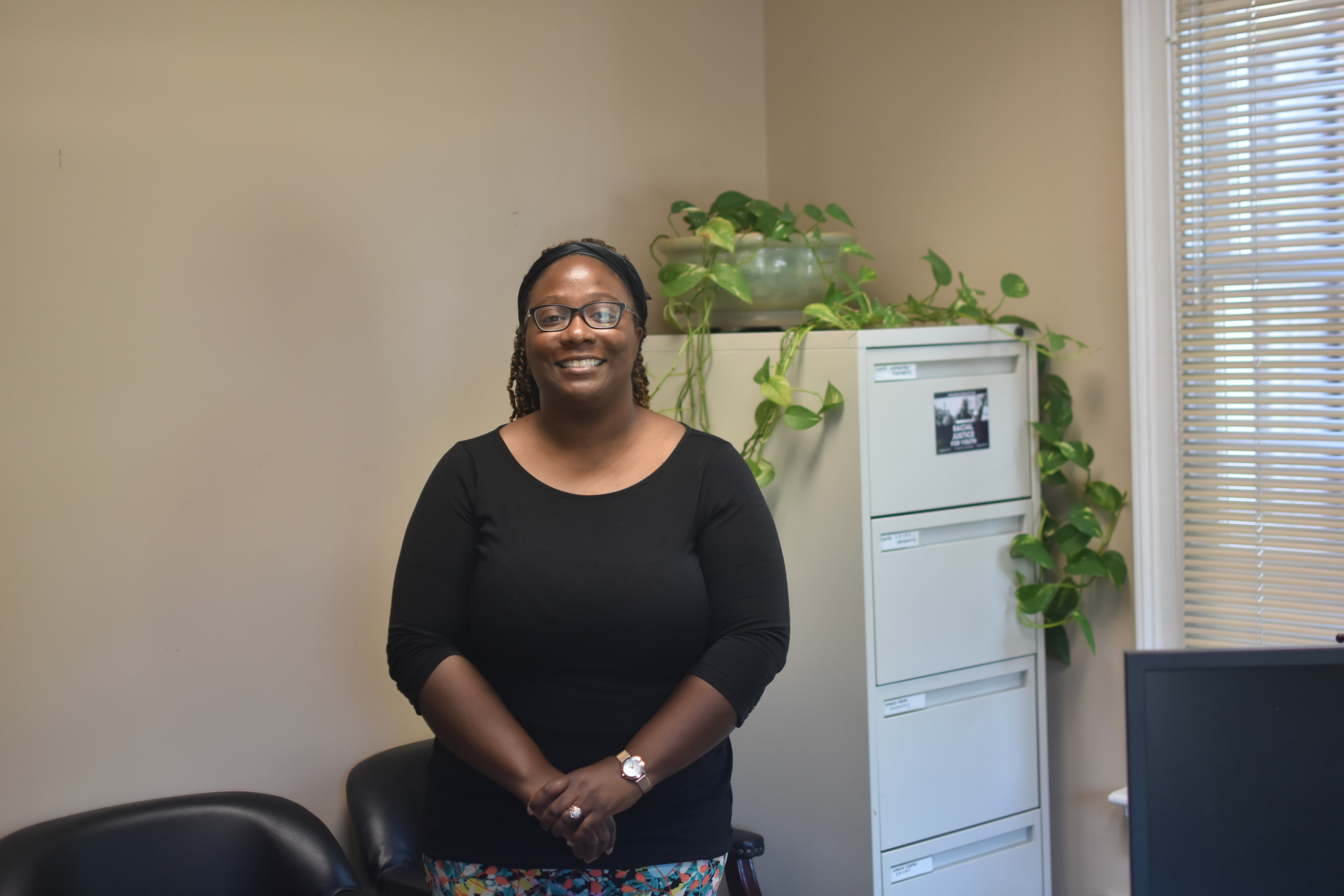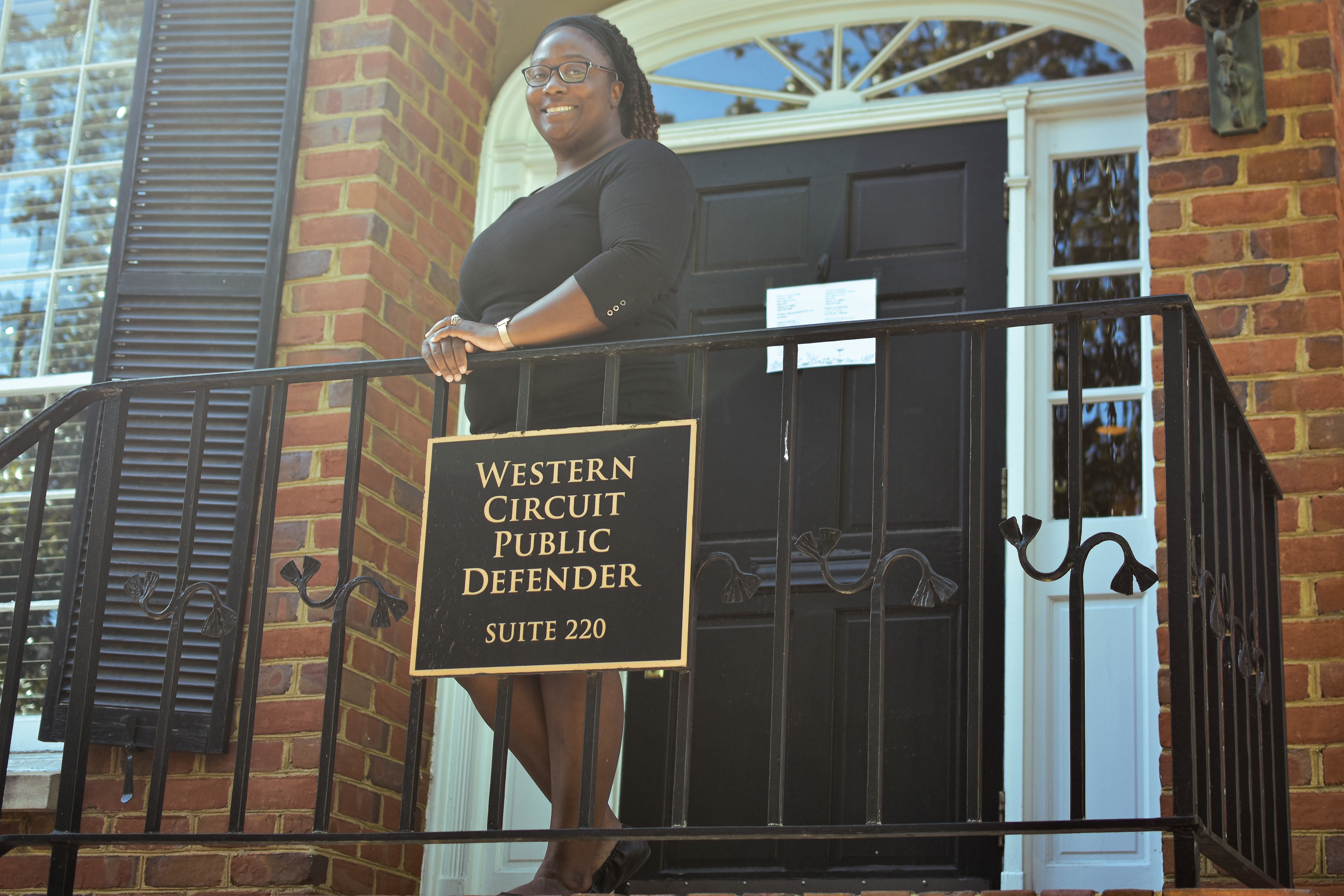Athens-Clarke County assistant public defender and juvenile court attorney Latasha Prempeh stands outside of the Western Judicial Circuit Public Defender Office on April 18. As a juvenile court attorney, Prempeh works only on cases that involve minors, and has dedicated her career to helping them stay safe. “(A highlight of my job) is being able to help a kid. Just being able to see the light bulb turn on. I think the best thing about it has been when I’m just out in the community somewhere and a parent comes up to me, or a past client comes up to me and they’re like, ‘Do you remember me?’ And I’m like, ‘Yes, I remember you,’” Prempeh said. “The challenges are that you unfortunately can’t save everybody. And I hate to see that happen when it does. I mean, we put our all into trying to save the youth, but occasionally it doesn’t happen and I go to sleep at night sometimes thinking about those kids that we were unable to help.” Photo by Lucas Donnelly
Photographer and Journalism I Facilitator Lucas Donnelly talks with Athens Juvenile Public Defender Latasha Prempeh about student rights, the criminal justice system and the school-to-prison pipeline.
Photographer and Journalism I Facilitator Lucas Donnelly: Could you please provide a brief overview of what your job entails as a public defender?
Athens Juvenile Public Defender Latasha Prempeh: So my job entails me mainly working in juvenile court. I handle any child that’s underneath the age of 17. In regards to what we call criminal offenses, mainly we call them offenses. So I handle any of those.
LD: Does it ever get difficult to remain objective when in front of a courtroom?
LP: I would say I’m probably not objective in a courtroom if that makes sense, because I’m client-centered, right? So I am supposed to be going completely for what my client wants. The judge is supposed to toe the line. I’m supposed to be (working) wholeheartedly for my client and making sure that I advocate for them. Now, if you mean separating the two, that’s taken some time to do as far as not taking the losses (personally). But it comes with time.
“I’m supposed to be (working) wholeheartedly for my client and making sure that I advocate for them.”
— Latasha Prempeh,
Athens Juvenile Public Defender
LD: From a lawyer’s perspective, have you noticed an increase in student arrests recently?
LP: Yes, there has been an increase. When I first started almost nine years ago, there was a really big influx of school cases that had kind of subsided, but recently, I’d say in the last couple of months, we’ve seen an increase again.
LD: Why do you think that that might be?
LP: I think it is a combination of things. I think we’ve seen an influx in the past of kids who were afraid. I know at one point there were threats of clowns. (People have) seen, unfortunately, some of the violence in neighborhoods. There’s been a wide range of reasons.
LD: What are some important aspects of student rights and law that you advise students to know?
LP: Be quiet. Honestly. You have the right to remain silent. So if you are being interrogated and officers question you, they’re supposed to read you your rights, and you have the right to remain silent — remain silent. Ask for your parents, ask for an attorney (and) remain silent. I think it’s one of the biggest things. I would also say, at least in the school perspective, that you have heightened standards and protections when it comes to the police versus your school administration. So the school administration is able to search your items (and) search your bags, but there’s a heightened level of protections that come to you when law enforcement is involved.

Athens Clarke County assistant public defender and juvenile court attorney Latasha Prempeh stands in her room in the Western Judicial Circuit Public Defender Office on April 18. Throughout her time as a lawyer, Prempeh has emphasized the importance of minors being educated on their rights. “As a lawyer, you realize that a child has more rights, in some regards. For instance, when you start talking about mirandizing a child, there’s a different set of factors that come into play than they do for adults, and most police officers don’t know that. And I don’t honestly expect them to know that. But sometimes that issue comes in just from the different types of knowledge. But yes, I definitely think there was a disconnect in regards to youth understanding where that line is in the sand, and what they’re allowed to do and what they’re not allowed to do,” Prempeh said. Photo by Lucas Donnelly
LD: Do you think that younger people can be taken advantage of by law enforcement due to the possibility of them being less educated on their rights?
LP: I think so. And I wouldn’t necessarily say that law enforcement has any nefarious thing that they’re trying to do. Like sometimes I don’t think they’re even trying to take advantage of the child. I think it’s just that (the children) don’t understand, ‘Okay, I don’t have to answer these questions,’ and unfortunately for them they give up some information that they shouldn’t have given up or that they didn’t have to give up. So I’ve seen that, and sometimes I have seen the threat of, ‘Okay, well we’re going to arrest you.’ Or sometimes I’ve seen the opposite, where the school resource officer is a friend, and then (the children) disclose (information), and then unfortunately, what they disclose is a crime, and then they’re unfortunately arrested for it. So I think it happens. I don’t necessarily think that there is evil intent behind it with all the factors, but it does happen. That a child is taken advantage of for lack of better words, because they don’t know any better when they’re talking.
LD: From your perspective, what is the school-to-prison pipeline?
LP: The school-to-prison pipeline is the idea that children of color are essentially punished more at school, (that they are judged) by more rigorous standards if that makes sense. And so they’re over punished at school, versus children that are not of color. Then the idea (is) that (it) leads them to being in the system more, (that) is essentially the idea of the pipeline.
LD: Do you think that the school-to-prison pipeline is a systemic pipeline?
LP: I think it is, in some ways. I think it kind of started off as that. It started off as that idea, but I think it’s kind of grown outside of it now. So it is a systemic problem in the sense that I don’t think it’s localized to the schools anymore, if that makes sense. You can look at the data and you can see that children of color are disproportionately represented in the system. And so I think now, it’s not so much a school-to-prison pipeline, as it is just a pipeline in general. And the idea that if a child at that heightened level of, once you are in the system, it increases your likelihood of continuing to be in the system. But I think there’s a statistic out there, I think that an arrest at 17 makes you X amount more likely to continue as an adult in the system. So I think it started off probably as kind of a systematic (issue) in the schools, disadvantaged schools punishing children of color more, but I think it has expanded to a systematic problem across the board.
“You can look at the data and you can see that children of color are disproportionately represented in the system. And so I think now, it’s not so much a school-to-prison pipeline, as it is just a pipeline in general.”
— Latasha Prempeh,
Athens Juvenile Public Defender
LD: Just to clarify, when you say the system, what system are you talking about?
LP: Just the criminal justice system in and of itself.
LD: As a public defender, how does it make you feel when you hear about students getting arrested on a personal level?
LP: It’s disheartening. It’s an experience. And it’s not an experience that, I at least, (and) anyone that I work with, takes lightly. It’s an experience in and of itself, just going to detention for one night. And so just thinking about that, and (how) that’s not something that the court will take lightly at all, it hurts to hear it. Because you know that that child has experienced now some type of trauma in going to the Regional Youth Detention Center. I know they try to make it as best as they can, but that in and of itself is technically an out-of-home placement. And so it just makes me more concerned for that child, because that’s just one more experience that they have in the system.
